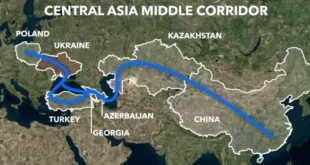“These are the basic lines of the national government headed by me: The Jewish people have an exclusive and unquestionable right to all areas of the Land of Israel. The government will promote and develop settlement in all parts of the Land of Israel – in the Galilee, the Negev, the Golan, Judea and Samaria.”
– Benjamin Netanyahu, December 30, 2023Anyone with but half eye open during the last several decades should by now realize that undisclosed Zionist Long Game preceded the establishment of Israel in 1948, and aims at extending Israeli sovereignty over the whole of Occupied Palestine, with the possible exception of Gaza. The significance of Netanyahu’s public affirmation of this previously secretive long game is that it may be reaching its final phase and the far right governing coalition is poised to pursue closure.
Netanyahu claim of exclusive Israel’s supremacy on behalf of the Jewish people over the whole of the promised land is in direct defiance of international law. Additionally, Netanyahu’s statement is at direct odds with Biden’s stubborn insistence, however farfetched, on reaffirming support for two-state solution. This zombie approach to resolving the Israel/Palestine struggle has dominated international diplomacy for years, usefully allowing the UN and its Western members to maintain their embrace of Israel without seeming to throw the Palestinian people under the bus.
Netanyahu’s brazen avowal of Israeli unilateral expansionism foregoes earlier diplomatic charades. It challenges the UN, Palestinian Authority, governments around the world, and transnational civil society to open finally both eyes and finally admit that the two-state solution is dead.
In fairness, it is true that this Zionist Long Game has only recently become apparent to all but the closest observers of the struggle. Throughout the 20thcentury this process of progressive expansionism was hidden from public view by a combination of Israeli domination of the public narrative and U.S. complicity, which deceived especially diaspora Zionists by assuming that Israel was open to a political compromise and that it was the Palestinians who were resisting a diplomatic outcome. Such an interpretation of the stalemate was always misleading. The Zionist Project from its very beginnings, more than a century ago, proceeded by stages to accept whatever was politically attainable at any given time, and then moving on to the next stage in its fuller colonization plan.
This pattern of expansionist priorities became especially evident in the periods following the Balfour Declaration of 1917 and after World War II. The infamous colonial Declaration had pledged British support for ‘a national home for the Jewish people’ in Palestine, made credible by accommodating ballooning Jewish immigration during the period of British mandatory administration that lasted from 1923 until 1948. Then came the UN partition resolution UNGA Res. 181), which not only ignored Palestinian rights of self-determination by partitioning their country without a prior referendum, changing the status of the Jewish presence from ‘national home’ within the state of Palestine to a sovereign Jewish state on fully half of Palestine. Such impositions were greeted positively by Zionist, but rejected by representatives of the Palestinian people and by neighboring Arab governments, leading directly to the 1948 War, which resulted in the catastrophic dispossession of an estimated 750,000 Palestinians, known to its victims as the nakba, ending with a ceasefire that increased Israel’s share of Palestine from 55% to 78%.
Then came the 1967 War, which drove Jordan out of the West Bank and East Jerusalem, dispossessed another wave of indigenous Palestinians, known among Palestinian as the naksa. It also resulted in Israel’s prolonger occupation, supposedly temporary but the establishment of many unlawful Jewish settlements encroaching on what had been projected as a coexisting Palestinian state in the West Bank and East Jerusalem strongly suggested that all along Israel’s leadership envisioned permanent arrangements with an end game in mind that did not include viable Palestinian statehood. Another strong straw in the wind back in 1967 was Israel immediate declaration and enactment of a sovereign claim over the whole of an enlarged Jerusalem as the ‘eternal capital’ of the Jewish state. This incorporation of Jerusalem was repeatedly rejected by overwhelming votes in the General Assembly, duly ignored by the Israeli government.
There were many lesser displays of virtuoso salami slicing of Palestinian rights and expectations in the subsequent 55 years. The Oslo diplomatic charade that lingered for 20 years after the hyped handshake between Rabin and Arafat on the White House lawn was the most notable stunt along these lines. With the benefit of hindsight, it seems clear that in the Israeli strategic imaginary ‘peace’ was never what Oslo was about. The real Israeli justification for Oslo, besides satisfying international pressure for some semblance of negotiations was to gain the needed time to make the settlement movement large and diffuse enough as to become irreversible. Such an obvious assault on the two-state mantra should then have been the death knell of two-state duplicity, but it wasn’t because its continuing international avowal, until now, was mutually convenient for both the Israeli leadership and to friendly foreign governments, and even to a UN too weak to insist on israeli compliance with international law. Israel’s 2018 Basic Law proclaiming the supremacy of Jews in ‘the promised land of Israel,’ including the whole of the West Bank, came a giant step closer to revealing the integral goals of the Zionist Progrect endorsed by Netanyahu to coincide with the swearing in of his fourth go at being the Prime Minister.
Yet, despite these manifest successes of this Zionist Long Game is from some perspectives more in doubt than it has ever been, strange as that might seem from a purely materialist view of politics. The Palestinian people have held firm in their commitment to self-determination throughout the century of being tested by this series of Israeli settler encroachments, including representation by the quasi-collaborative leadership offered by the Palestinian Authority. The spirit of resistance and struggle has been sustained by a Palestinian deep culture of steadfastness of sumud. Resistance while sporadic never disappeared.
Additionally, the weight of evolving historical circumstances has enabled the Palestinians to achieve important victories in The Legitimacy War being waged by the two peoples for the control of symbolic and normative spaces in the wider struggle. Over the course of the last decade the international political discourse increasingly accepted the Palestinian narrative of Israel as ‘a settler colonial state,’ a damaging assessment in an era where colonialism elsewhere was being dismantled by the weaker side militarily, suggesting the unrecognized leverage of law, morality, and nationalist mobilization in out maneuvering a militarily superior adversary.
Beyond this, and more formally, the once radical accusation of apartheid directed at the Israeli state became validated over the course of the last six years by carefully documented reports of the UN (ESCWA), Human Rights Watch, Amnesty International, and even the fiercely independent Israeli NGO, B’Tselem. As memories of the Holocaust faded and wrongdoing toward Palestinian rights became harder to shove under the rug, world public opinion especially in the West, became somewhat more sympathetic to and convinced by the Pallestinian narrative, and as significantly, the relevance of the South African precedent became harder to ignore.
Further symbolic Palestinian victories included widespread diplomatic recognition of Palestinian statehood by many governments in the Global South, non-voting membership in the UN, access to the International Criminal Court and its 2021 judgment authorizing the investigation of Palestinian allegations of international crimes in Occupied Palestine after 2014, and at the end of 2022 of the approval by a wide margin of a General Assembly Resolution requesting an Advisory Opinion from the World Court in The Hague on the prolonged unlawful occupation of Palestinian territories. The 2022 HRC appointment of a high-level Commission of Inquiry with a broad mandate to investigate Israel wrongdoing occurred after the frustrations associated with decades of israeli non-compliance with international humanitarian law in the OPT.
Israeli and its puppet NGOs, UN Watch and NGO Monitor, recognized the gravity of these developments, as did the Israeli government, being intelligently sensitive to the precedent set. by the collapse of the apartheid regime in South Africa as a result of a blend of resistance, symbolic delegitimation, and global solidarity initiatives. Israel and its militants fought back, with unwavering support of the U.S. Government, but not substantively, recognizing the risks of bringing any further attention to the substance of Israel’s policies, practices, and racist ideology. Instead, it attacked the critics and their institutional venues, including even the UN, as antisemitic, smearing conscientious legal experts and even international civil servants and the institutions themselves. This has created a sufficient diversionary smokescreen to enable Biden and top EU bureaucrats to keep faith with the ever more hollow prospect of ‘two states for two peoples’ when they must know by this time that such a policy has is moribund even as a public relations tactic. Especially now that an apparently cocky Netanyahu has told them so to their faces.
Given this line of interpretation, contrary to media commentary, Netanyahu is likely pleased that his governing coalition includes the Religious Zionism (RZ) and Jewish Powerbloc. RZ, led by Bezalel Smotrich and Itamar Ben-Gvar seem useful, if not natural allies of Likud in launching this culminating phase of the Zionist Project, which involves territorial consolidation over the whole of the promised land and likely moves to inflict further dispossession of Palestinians—a second Nakba—from their native lands. Seen in this way, the Netanyahu declaration above amounts to a virtual road map, hopefully with RZ taking most of the blame for its inflammatory and likely violent implementation.
Given this background, the present context should be understood differently than the prevailing mode of reporting on the most right-wing and extremist government in the history of Israel and the awkwardness of relying on a coalition that gives dangerous influence to RZ. It is instructive to notice that most of the regrets expressed in the U.S. about the outcome in the 2022 Israeli elections is its possibly negative impact on support for Israel in the liberal democracies, especially, among predominantly secular dominant communities in the Jewish diaspora. Little empathy or concern is expressed by the probability of intensifying suffering endured by the Palestinians, whose plight has been subject to Orientalist erasures throughout the struggle.
In Biden’s indoubtedly unconscious display of such Orientalist insensitivity to Palestinian rights, much less their legitimate aspirations, the wording of an official statement congratulating Netanyahu, Biden warrants scrutiny: “I look forward to working with Prime Minister Netanyahu, who has been my friend for decades, to jointly address the many challenges and opportunities facing Israel and the Middle East region, including threats from Iran.” In the same text, the American president asserts that “the United States will continue to support the two state solution and to oppose policies that endanger its viability or contradict our mutual interests and values.”
Most pro-Israeli commentary on the shift to the right on the part of the Israeli voting public attributes the extremist outcome in the November elections to either the absence of ‘a partner’ in the search for peace, a response to Palestinian ‘terrorism’ or the rising influence of the religious right within Israel, and the emboldening effects of the normalization agreements (so-call Abraham Accords) reached in 2020 during the last months of the Trump presidency. Undoubtedly, these contextual factors were influential in persuading a larger segment of Israeli voters to swallow their dislike of a governing coalition that gave strong influence to RZ, seemingly the foretaste of a now plausible Jewish theocratic fascism, preferring their hopes of a unilaterally imposed Israeli ‘victory’ scenario to the hypocritical uncertainties of the diplomatic status quo that is disinterested in negotiating a political compromise with its Palestinian counterpart.
My own encounters with liberal Zionist in America emphasized that Israeli good will with respect to a political deal with the Palestinian had run into a brick wall of Palestinian hard line opposition, an indirect validation of the ‘no partner’ excuse, or at best, the false symmetry of blaming both sides in a situation where one side was the oppressor and the other the oppressed, a situation accentuated by the insistence that Israeli’s closest ally and geopolitical source of security serve as intermediary. Nothing exhibited Palestinian weakness more dramatically than their willingness to rely on such a flawed diplomatic process for the realization of their prospect of such basic rights as self-determination.
While these factors have been endlessly analyzed in piecing together in composing an exoteric or public narrative, the real story—the deep roots of these developments—is yet to be told. It is bound up with an esoteric or secret narrative that antedates the establishment of Israel in 1948, and whose slow unfolding involved the pragmatic adaptation of the utopian character of Zionist Project of recovering Palestine during a period when these ultimate goals seemed hopelessly out of reach.
 Eurasia Press & News
Eurasia Press & News




